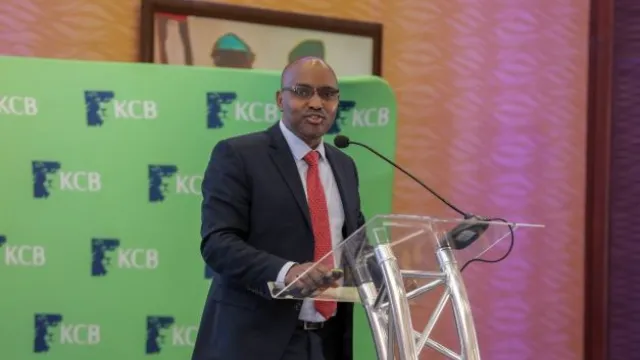KCB nine-month profit up 21.4 percent to Kes30.6 billion

KCB nine-month profit up 21.4 percent to Kes30.6 billion
Regional lender KCB Group net profit rose 21.4 percent to Kes30.6 billion in the first nine months of the year on the back of sustained growth from both net interest and non-funded income lines.
Earnings from the lender's subsidiaries went up by 16.3 percent, up from 15.2 percent in a similar period in 2021, driven by new businesses and the impact of KCB Group Rwanda unit, BPR Bank.
KCB Group, which has a presence in six countries Tanzania, South Sudan, Uganda, Rwanda, Burundi, and a representative office in Ethiopia, has been keen to tap into new growth opportunities while reinforcing existing market capabilities.
KCB Group CEO Paul Russo said, “We are seeing strong revenue momentum across the corporate and retail business which positions us to meet our full-year outlook. Our focus has been on delivering value and support to our customers to help them navigate the tough economic environment."
In the period, the Group's total revenues increased by 15.3 percent to Kes92.1 billion attributable to the growth in non-funded income such as foreign exchange earnings and lending fees that went up by 30.2 percent.
Additionally, interest income grew mainly from an increase in the bank's earning assets portfolio in particular loans disbursed during the period and investment in government securities.
The lender's loan portfolio grew by 16.4 percent to Kes758.8 billion on account of additional lending to the personal, building and construction, and manufacturing industries.
Last month, KCB announced it has set aside Kes250 billion to fund women entrepreneurs in the next five years, cementing the Bank’s role in catalyzing economic growth.
Read also: IMF lauds Kenya for dropping fuel subsidy, readies Sh53 billion new loan
Further, customer deposits increased by 7.4 percent to Kes922.3 billion on higher mobilization of funds from current and savings accounts.
Shareholders’ funds grew by 15.2 percent from Kes163.0 billion to Kes187.8 billion on improved and accumulated profits for the year to date. the Board proposes an interim dividend of Kes1.00 a share.
The Group maintained strong capital buffers with core capital as a proportion of total risk-weighted assets standing at 14.5 percent against the statutory minimum of 10.5 percent.
Operating costs, however, went up 19.6 percent to Kes41.6 billion compared to Kes34.8 billion reported in the nine-month period that ended September 2021.
KCB said the rise in costs was attributable to the impact of BPR Bank, increased business activities and the jump in staff costs. This saw the cost-to-income ratio stand at 45.1 percent for the period.
The Group has put in place cost-saving initiatives targeting savings across all its businesses, the bank said.
The balance sheet expanded 13.7 percent with total assets standing at KShs1.28 trillion largely driven by growth in loans, investment in government securities funded by growth in customer deposits, and additional borrowings.
In September, KCB Group Plc shareholders approved the proposed acquisition of the DRC-based lender Trust Merchant Bank SA (TMB).
This followed the signing of a definitive agreement with shareholders of TMB to acquire 85 percent of the shares in TMB while the existing shareholders will continue to hold the balance for a period of not less than two years after which KCB will have the right to acquire their shares.
The acquisition is part of KCB's ongoing strategy to expand its regional participation, accelerate growth and maintain sustainable long-term regional success.
“Reflecting on the nine months, we have had a good run, and the business remains resilient and well within the target on Group for the three quarters,” said KCB Group Chairman Andrew Wambari Kairu.
“We are optimistic of continued revenue growth across all our businesses, with projected GDP growth in all markets amidst currency depreciation and high inflation in most of the countries we operate in” he added.



